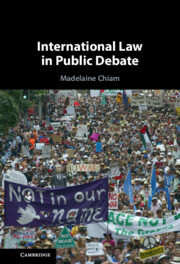
- Cited by 1
-
Cited byCrossref Citations
This Book has been cited by the following publications. This list is generated based on data provided by Crossref.
Hodgson, Natalie 2024. #AUSPOL #WARCRIMES #ICC: exploring the social media response to a communication to the International Criminal Court. Griffith Law Review, Vol. 33, Issue. 2, p. 125.
- Publisher:
- Cambridge University Press
- Online publication date:
- November 2021
- Print publication year:
- 2021
- Online ISBN:
- 9781108588584
- Subjects:
- Socio-Legal Studies, Public International Law, Law


